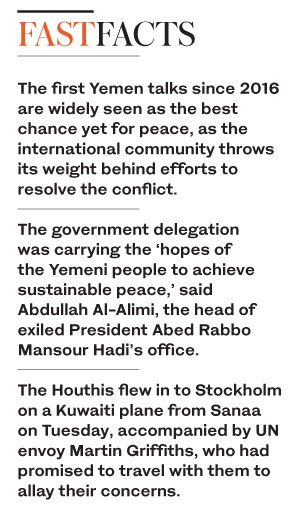Renewed push for peace as Western Sahara talks open in Geneva
GENEVA: The first UN-backed discussions on the disputed Western Sahara region since 2012 opened in Geneva on Wednesday, but expectations remained low, with the meeting seen as just a first step towards resuming dialogue.
Six years after direct talks broke down, Morocco and the Polisario Front, which fought a war over the region until a 1991 ceasefire, are taking part in two days of roundtable discussions along with Algeria and Mauritania.
UN envoy Horst Koehler, a former German president, is hosting the talks, which kicked off at the UN headquarters in Geneva on Wednesday afternoon.
In his October invitation letter to the talks, Koehler insisted it was “time to open a new chapter in the political process”.
The UN meanwhile has described the talks as “a first step towards a renewed negotiations process with the aim of reaching a just, lasting and mutually acceptable solution, which will provide for the self-determination of the people of Western Sahara.”
A former Spanish colony, phosphate-rich Western Sahara sits on the western edge of the vast eponymous desert, stretching around 1,000 kilometres (600 miles) along the Atlantic coastline, a prime fishing region.
When Spain withdrew from the North African territory in 1975, Rabat sent thousands of people across the border and claimed it was an integral part of Morocco.
The following year the Polisario Front declared Western Sahara the Sahrawi Arab Democratic Republic (SADR), with support from Algeria and Libya, and demanded a referendum on self-determination.
Since then 84 UN member states have recognised the SADR.
But a stalemate ensued, and Morocco built razor-wire-topped concentric sand walls in the desert that still ring 80 percent of the territory it controls.
Under a 1991 ceasefire, the United Nations deployed a peacekeeping mission which has perpetuated the line of control, but the international community has long intended for a referendum to be held to decide the territory’s status.
Rabat currently rejects any vote in which independence is an option, arguing that only granting autonomy is on the table and that this is necessary for regional security.
Awaiting a settlement, between 100,000 and 200,000 refugees live precariously in camps near the town of Tindouf in western Algeria, not far from the Moroccan and Western Sahara borders.
The last direct talks were launched by the UN in 2007 but collapsed five years later over the territory’s status and the proposed referendum.
Koehler, who has led the diplomatic efforts since 2017, is hosting the foreign ministers of Morocco, Algeria and Mauritania on Wednesday, as well as a Polisario delegation headed by Khatri Addouh, the speaker of the Sahrawi parliament.
But the agenda for the meetings remains vague and the format has not been unanimously agreed.
Algeria wants to participate only as an “observer country”, but Rabat considers it a “stakeholder” in the discussions, since Algiers is the Polisario’s main backer.
In a statement issued Wednesday, Algiers said Foreign Minister Abdelkader Messahel has met with Koehler and reiterated his country’s support for the process “in its capacity as a neighbouring country”.
And while all sides signalled goodwill ahead of Wednesday’s meeting, they did not budge from their positions.
King Mohammed VI has said he supports a “durable” political solution marked by a “spirit of compromise”, but in a recent speech he insisted that Morocco would not yield on its “territorial integrity”, including control over Western Sahara.
And key Polisario official Mhamed Khadad told AFP ahead of the talks that “everything can be negotiated except the inalienable and imprescriptible right of our people to self-determination.”
Diplomats and others with insight into the process have meanwhile played down the prospect of any real breakthrough.
One diplomat stressed that the roundtable was “not a negotiation” but rather a meeting “that will make it possible to test the real will of the parties, and to determine if they should move forward” or not.
Observers meanwhile point to increased pressure on the sides to find a solution, after the UN Security Council recently adopted a US-drafted resolution to renew a small peacekeeping mission at the ceasefire line, but cut its mandate from 12 to six months.
Nour Bakr, with the non-profit Independent Diplomat which advises the Polisario Front, meanwhile called for more EU support for the process, lamenting that the bloc is negotiating major trade deals with Morocco that involve Western Sahara.
The Europeans “try to make a separation between having these trade deals and claiming to support the political process,” he told AFP.
But “they are de facto recognising Morocco’s sovereignty.”

UN welcomes moves to restart negotiations on Western SaharaMorocco pushes development in disputed Western Sahara





